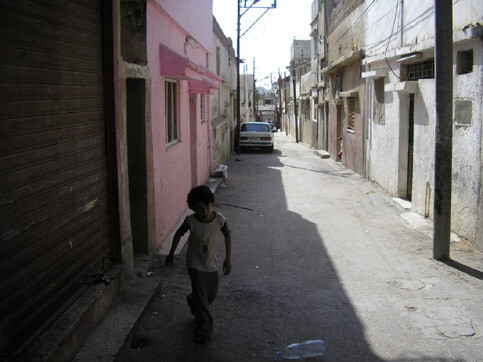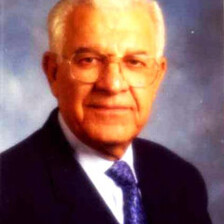Palestine Report 14 July 2005

Wihdat, or Amman New Camp, is the largest Palestinian refugee camp in Jordan. (Arjan El Fassed)
This week Palestine Report Online interviews the director general of the PLO Refugees Affairs Department, Saji Salameh, on President Mahmoud Abbas’ recent comments on granting Arab citizenship to Palestinian refugees.
PR: What do you think of President Abbas’ statement about Arab host countries granting refugees citizenship?
Salameh: It is only natural that Abu Mazen would pose the problem of the Palestinians in the diaspora in the context of his tour of various Arab countries including Syria, Lebanon and Jordan. He brought up a number of issues exclusive to the situation of refugees so of course this included labor, travel and residency rights. They also spoke about the issue of citizenship. In this context, Abu Mazen expressed his concerns about refugees in the diaspora and even those in the homeland, stressing on their adherence to the right of return to their homes and the rejection of being resettled, which would ultimately end the refugee problem.
On this premise, Abu Mazen declared that there was nothing to prevent the Arab countries from taking a sovereign decision to offer citizenship to refugees to anyone who wants. This of course, is with the guarantee that such a measure would in no way impinge on the legal right of refugees to return, to restitution and to compensation. Therefore, the framework of such a debate is the lives of the refugees, who have been displaced for over 57 years. There are a number of problems in terms of their legal and civil status in the Arab countries and others.
PR: Don’t you think such a move would somehow become an obstacle to realizing their historical right to return?
Salameh: Definitely not. Evidence of this is that there are at least 1.5 million refugees in the Palestinian Authority territories who hold Palestinian citizenship. This does not impinge on their legal rights as refugees, which are enshrined in international resolutions, international humanitarian law, which are their rights to return and to regain their properties. Also, about two million Palestinians carry Jordanian citizenship and live in Jordan. No one has ever told them that obtaining Jordanian citizenship would deprive them de facto of their right to return to their homeland. It is well known that the Palestinians are spread out across the world. There are those who have American, Canadian and British passports, but this does not impinge on their legal rights, which are guaranteed by international law and UN resolutions.
Any attempt to confuse issues is not taken by us in the PLO lightly. These are attempts to distort the reality and to give erroneous explanations for the clear Palestinian position on this issue.
PR: Does Abu Mazen’s statements express a shift in the leadership’s position on the refugees after so many years?
Salameh: Definitely not. This does not mean any change in the Palestinian position. On the contrary, it is compatible with this position because, in addition to adhering to refugee rights, this also shows a concern for and interest in the lives of the refugees. The refugees live in very poor circumstances in some areas and there are a number of new developments that need even more follow-up from the PLO in terms of what is happening to Palestinians in Iraq or at the Iraqi-Jordanian border. On this basis, the leadership welcomed the decision by the Lebanese government to allow refugees to work in 55 of the more than 70 professions they were banned from previously. The truth is there is a need for further expansion of these facilities for refugees.
PR: Do you think the refugees themselves will agree to this?
Salameh: This is a two-sided issue. You cannot force citizenship on any Palestinian. When the Palestinian state is realized, it will be a state for all Palestinians. No one will have the right - not a government official or a head of state - to deprive any Palestinian who wants to live in the Palestinian state. It is not a state only for the residents of the West Bank and Gaza. Whoever wishes to return to the state or apply for citizenship, this is their right. This is Palestine and all Palestinians have a right to this state. As for other countries, no one can force them to give refugees citizenship. This is a sovereign decision of the country. If the country offers, it is then up to the Palestinians to accept citizenship or not. In any case, the Palestinian state is obliged to offer citizenship to all Palestinians.
PR: In all, do you think this could be a positive development for Palestinians?
Salameh: If it does not impinge on their rights, I think it is a sound move. Instead of being stranded in airports because no country will accept them, it would be good if they had citizenship of a country. At the same time, they would retain their right to return to the homeland.
In any case, refugee rights are a national responsibility, which has been assumed by the PLO and will be one of the most pressing negotiating points. There can never be a permanent solution accepted by the people and the refugees without a solution to this problem. There can be no peace without it.
PR: But don’t you think this could weaken the position of the right of return for refugees in the international arena?
Salameh: Not at all. There are at least 3.5 million refugees who have Palestinian or Jordanian citizenship. If this impinges on their refugee rights, what does that mean? That the refugee cause is about the remaining minority? No, there is a major cause, which is the legal and human rights of refugees that are internationally recognized. It is not a marginal case for a few scattered groups here and there. This is about a major sector for which a just solution will be reached through the negotiating process and international resolutions.



